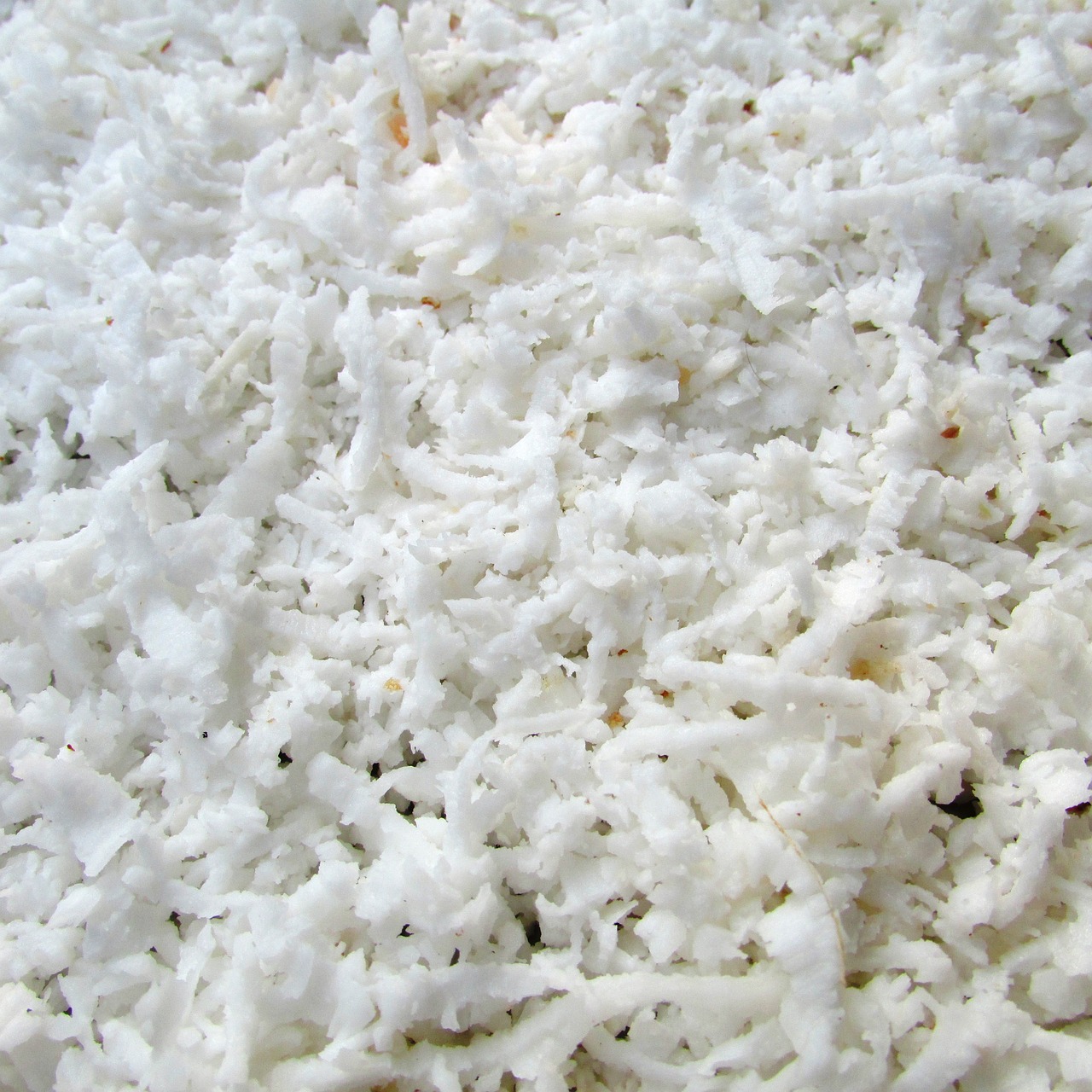The Benefits of Adding Coconut Oil to Your Pet's Diet
Are you looking for a way to boost your pet's health and well-being? Look no further than coconut oil! This natural oil has gained immense popularity not just in human diets but also as a beneficial addition to our furry friends' nutrition. With its myriad of health benefits, coconut oil can be a game-changer for your pet's overall wellness. From improving coat health to aiding digestion, this versatile oil is packed with essential fatty acids and nutrients that can transform your pet's life. Let’s dive deeper into the incredible advantages of incorporating coconut oil into your pet's diet!
One of the most noticeable benefits of coconut oil is its ability to enhance your pet's coat. If you've ever wished for your dog or cat to have a shinier, healthier-looking coat, coconut oil might just be the solution you need. The fatty acids found in coconut oil work wonders by nourishing the skin and reducing dryness and flakiness. Regular use can lead to a soft, lustrous coat that will make your pet the envy of the neighborhood. Think of it as a spa treatment for your pet's fur, giving them that extra shine and softness!
Coconut oil is not just a pretty face; it also plays a crucial role in your pet's digestive health. By promoting the growth of healthy gut bacteria, coconut oil can help alleviate common digestive issues such as constipation and diarrhea. When your pet's gut is happy, they can absorb nutrients more effectively, leading to better overall health. Imagine your pet feeling lighter and more energetic after a meal—coconut oil can be the secret ingredient that makes it happen!
For pets suffering from arthritis or joint pain, coconut oil can be a blessing. Its anti-inflammatory properties may help reduce discomfort and improve mobility, allowing your furry friend to enjoy their daily activities without pain. Just picture your older dog chasing after a ball again or your cat jumping up on their favorite perch—coconut oil could help bring back that youthful spirit!
Have you noticed your pet scratching or licking excessively? Coconut oil can be used topically to soothe various skin conditions, including hot spots and allergies. Its antimicrobial properties help prevent infections and promote healing, making it a fantastic natural remedy. Applying coconut oil to your pet's skin can be like giving them a soothing balm that calms irritation and encourages healing from the inside out.
Allergies can be a real nuisance for pets, just like they can be for humans. Incorporating coconut oil into your pet's diet may help reduce allergy symptoms. By supporting the immune system, coconut oil makes your pet less susceptible to allergens. Imagine your pet enjoying the great outdoors without constantly sneezing or scratching—coconut oil could be the key to a happier, more comfortable life!
If your pet seems a bit sluggish, coconut oil might just provide the energy boost they need. The medium-chain triglycerides (MCTs) found in coconut oil serve as a quick source of energy, enhancing stamina and supporting overall activity levels. Think of it as a power-up for your pet, helping them stay active and playful throughout the day. Whether it's a game of fetch or a spirited chase around the house, coconut oil can help keep your pet energized!
Maintaining a healthy weight is crucial for your pet's overall health, and coconut oil can assist in that journey. By adding coconut oil to your pet's diet, you can help support a healthy metabolism, making it easier for them to achieve or maintain their ideal weight. It’s like having a personal trainer in a bottle, guiding your pet towards their fitness goals!
Another fantastic benefit of coconut oil is its ability to increase feelings of fullness in pets. This can significantly reduce the likelihood of overeating, which is especially helpful for pets on weight-loss diets. Imagine your pet feeling satisfied after meals, leading to healthier eating habits and a happier life overall. Coconut oil can help your pet feel full and content, making mealtime a breeze!
While coconut oil is generally safe for most pets, it’s essential to introduce it gradually into their diet. Keep an eye out for any adverse reactions and consult your veterinarian for guidance. Just like any new addition to your pet’s diet, moderation is key. Think of it as a new adventure for your pet's taste buds—start slow, and watch them thrive!
- Can all pets consume coconut oil? Generally, yes! Most dogs and cats can benefit from coconut oil, but always consult your vet first.
- How much coconut oil should I give my pet? Start with a small amount, such as 1/4 teaspoon for small pets and up to 1 tablespoon for larger ones. Adjust as needed.
- Can coconut oil help with bad breath? Yes! Its antibacterial properties can help combat bad breath in pets.

Improved Coat Health
This article explores the various advantages of incorporating coconut oil into your pet's nutrition, highlighting its health benefits, usage tips, and potential effects on different animals.
Have you ever noticed how some pets seem to have that gorgeous, shiny coat that makes you want to pet them all day long? Well, incorporating coconut oil into your pet's diet can be a game-changer! The secret lies in the fatty acids found in coconut oil, which work wonders for your furry friend's skin and coat health. These fatty acids, particularly lauric acid, are known for their nourishing properties, helping to reduce dryness and flakiness that can lead to an unkempt appearance.
Imagine your pet's coat as a beautiful garden. Just like plants need water and nutrients to thrive, your pet's skin and fur require the right ingredients to look their best. Coconut oil acts like a fertilizer, providing essential nutrients that promote a healthier, shinier coat. Not only does it moisturize the skin, but it also helps to lock in moisture, preventing that dreaded dry, itchy skin that many pets suffer from.
But wait, there's more! Coconut oil is also packed with antimicrobial properties, which means it can help combat skin infections and irritations. This is especially beneficial for pets who are prone to allergies or skin conditions. By applying coconut oil topically or adding it to their food, you can give your pet the extra support they need to maintain a healthy coat.
Here’s a quick breakdown of how coconut oil can improve your pet's coat health:
| Benefit | Description |
|---|---|
| Moisturizes Skin | Reduces dryness and flakiness, promoting a soft, shiny coat. |
| Enhances Shine | Gives the coat a healthy, lustrous appearance. |
| Reduces Allergies | Helps soothe irritated skin and reduces allergic reactions. |
| Fights Infections | Its antimicrobial properties help prevent skin infections. |
To sum it up, adding coconut oil to your pet's diet is like giving them a spa day every day! Whether you choose to mix it into their food or apply it directly to their coat, the results can be truly remarkable. Just remember to start with small amounts and observe how your pet reacts. After all, every pet is unique, and what works wonders for one may not be the same for another!
Coconut oil may improve your pet's digestion by promoting healthy gut bacteria. It can help alleviate issues like constipation and diarrhea, ensuring better nutrient absorption.
The anti-inflammatory effects of coconut oil can benefit pets with arthritis or joint pain. Regular use may lead to improved mobility and reduced discomfort.
Coconut oil can be used topically to soothe various skin conditions, including hot spots and allergies. Its antimicrobial properties help prevent infections and promote healing.
Incorporating coconut oil into your pet's diet may help reduce allergy symptoms. It can support the immune system, making your pet less susceptible to allergens.
Coconut oil provides a quick source of energy for pets. The medium-chain triglycerides (MCTs) in coconut oil can enhance stamina and support overall activity levels.
Adding coconut oil to your pet's diet can aid in weight management. It helps maintain a healthy metabolism, making it easier for pets to achieve or maintain their ideal weight.
Coconut oil can increase feelings of fullness in pets, reducing the likelihood of overeating. This can be particularly helpful for pets on weight-loss diets.
Coconut oil is generally safe for most pets but should be introduced gradually. It's important to monitor for any adverse reactions and consult a veterinarian for guidance.
- Can all pets consume coconut oil? Most pets can safely consume coconut oil, but it's best to consult with your veterinarian before introducing it to your pet's diet.
- How much coconut oil should I give my pet? Start with a small amount, such as 1/4 teaspoon for small pets and 1 teaspoon for larger pets, and gradually increase if needed.
- Are there any side effects? Some pets may experience digestive upset if given too much coconut oil at once, so always monitor their reaction.

Digestive Aid
Coconut oil is not just a trendy health food for humans; it can also be a fantastic addition to your pet's diet, particularly when it comes to digestive health. Imagine your pet's gut as a bustling city, where healthy bacteria are the friendly residents keeping everything running smoothly. When you introduce coconut oil into your pet's meals, you're essentially inviting these good bacteria to thrive, creating a harmonious environment in their digestive tract. The medium-chain triglycerides (MCTs) found in coconut oil can help promote the growth of beneficial gut bacteria, ensuring that your furry friend has a happy and healthy tummy.
But what does this mean for your pet? Well, for starters, coconut oil can help alleviate common digestive issues such as constipation and diarrhea. Think of it as a gentle lubricant that helps food pass through the intestines more easily. When your pet consumes coconut oil, it can aid in breaking down food more effectively, leading to better nutrient absorption. This is particularly important because if your pet isn't absorbing nutrients properly, they could be missing out on essential vitamins and minerals that keep them healthy and full of energy.
Moreover, the anti-inflammatory properties of coconut oil can reduce inflammation in the gut, which can be particularly beneficial for pets suffering from conditions like inflammatory bowel disease (IBD). By soothing the digestive tract, coconut oil can help ease discomfort and promote a more balanced gut environment.
To incorporate coconut oil into your pet's diet, start with small amounts. A teaspoon for smaller pets or a tablespoon for larger ones is a good starting point. You can mix it into their food or even offer it as a treat. Just remember to monitor your pet for any changes in their digestion. If you notice any adverse reactions, it's always best to consult with your veterinarian.
In summary, adding coconut oil to your pet's diet can be a simple yet effective way to enhance their digestive health. With its ability to promote healthy gut bacteria, ease digestive discomfort, and improve nutrient absorption, coconut oil is a powerhouse ingredient that can help your pet live a happier, healthier life.
- How much coconut oil should I give my pet? Start with a small amount, such as a teaspoon for small pets and a tablespoon for larger pets, and gradually increase as tolerated.
- Can all pets have coconut oil? Generally, coconut oil is safe for most pets, but it's important to introduce it gradually and consult with your veterinarian.
- What if my pet has a sensitive stomach? If your pet has a sensitive stomach, it's best to consult your veterinarian before introducing coconut oil.
- Will coconut oil help with my pet's bad breath? Yes, coconut oil can help improve oral health and reduce bad breath due to its antibacterial properties.
Anti-inflammatory Properties
When it comes to our beloved pets, we want to ensure they live a happy and healthy life. One of the surprising benefits of incorporating coconut oil into their diet is its remarkable . Just like how a soothing balm can ease our sore muscles, coconut oil can provide relief for pets suffering from joint pain or arthritis. This is largely due to the presence of medium-chain fatty acids, which work wonders in reducing inflammation in the body.
Imagine your pet, once full of energy and playfulness, now struggling to jump onto the couch or chase after a ball. It can be heartbreaking to witness their discomfort. By adding coconut oil to their meals, you might just rekindle that spark! Regular consumption of coconut oil can promote better mobility and reduce discomfort, allowing your furry friend to enjoy their daily activities once again.
But how does it actually work? The medium-chain triglycerides (MCTs) found in coconut oil help inhibit the production of inflammatory compounds in the body. This means that pets with chronic inflammation can experience significant relief. It's like giving them a natural shield against the discomfort that comes with aging or injury. Furthermore, studies have shown that these MCTs can support the overall health of your pet's joints, making them more resilient to wear and tear.
It's essential to note that while coconut oil can be a fantastic addition to your pet's diet, it should not replace any prescribed medications for conditions like arthritis. Always consult with your veterinarian before making any changes to your pet's diet, especially if they have existing health issues. Your vet can provide guidance on the appropriate amount of coconut oil to incorporate based on your pet's size, weight, and overall health.
To make it easier for you to understand the benefits, here’s a quick comparison of how coconut oil stacks up against other common anti-inflammatory options:
| Property | Coconut Oil | Fish Oil | Tumeric |
|---|---|---|---|
| Source | Natural oil | Omega-3 fatty acids | Herb |
| Ease of Use | Easy to mix in food | Capsules or liquid | Can be messy |
| Effect on Joints | Reduces inflammation | Supports joint health | Anti-inflammatory properties |
| Additional Benefits | Improves coat health | Supports heart health | Antioxidant properties |
In conclusion, the anti-inflammatory properties of coconut oil can be a game changer for pets suffering from joint pain or arthritis. It's a natural and effective way to enhance your pet's quality of life, helping them regain their zest for life. So why not give it a try? Your furry friend might just thank you with a wagging tail and a playful leap!
- Can all pets benefit from coconut oil?
Yes, most pets can benefit from coconut oil, but it's best to consult your veterinarian first. - How much coconut oil should I give my pet?
Start with a small amount, typically 1 teaspoon for small pets and 1 tablespoon for larger dogs, and adjust as needed. - Are there any side effects?
Some pets may experience digestive upset if given too much coconut oil, so it's important to introduce it gradually. - Can I use coconut oil topically as well?
Absolutely! Coconut oil can be applied to your pet's skin to help soothe irritations and promote healing.
Skin Conditions
Coconut oil is a remarkable natural remedy that can work wonders for your pet's skin. If you've ever noticed your furry friend scratching or biting at their skin, you know how distressing it can be. The good news is that coconut oil can help soothe various skin conditions, making it a fantastic addition to your pet’s wellness routine. Its antimicrobial properties are particularly beneficial, as they help prevent infections that can arise from excessive scratching or irritation.
When applied topically, coconut oil can create a protective barrier on the skin, locking in moisture and promoting healing. This is especially helpful for pets suffering from hot spots, which are inflamed and infected areas of the skin that can cause significant discomfort. By applying coconut oil, you can help reduce inflammation and provide relief. Additionally, the oil contains medium-chain fatty acids that have shown to be effective against various bacteria and fungi, further supporting skin health.
Another common issue that coconut oil can address is dry skin. If your pet’s skin is flaky or itchy, incorporating coconut oil into their routine can help restore moisture and elasticity. Just like how we use lotion to hydrate our skin, coconut oil can be used to give your pet's skin the nourishment it craves. You can either apply it directly to the affected areas or mix it into their food for internal benefits.
However, it’s important to note that while coconut oil can be a great remedy, it should be used with caution. Always start with a small amount to see how your pet reacts, as some animals might have sensitivities. If you notice any adverse effects, such as increased itching or redness, it’s best to discontinue use and consult your veterinarian.
In summary, coconut oil is a versatile and effective solution for managing skin conditions in pets. Its natural properties not only promote healing but also enhance overall skin health, making it a must-try for any pet owner looking to improve their furry friend's quality of life.
- Can I use coconut oil on all pets? - Generally, yes! Coconut oil is safe for most pets, including dogs and cats. However, always consult your veterinarian before introducing any new supplement into your pet's diet.
- How should I apply coconut oil to my pet? - You can apply it topically to affected areas or mix it into their food. Start with a small amount and monitor your pet's reaction.
- What if my pet has allergies? - If your pet has known allergies, it’s crucial to consult with your veterinarian before using coconut oil, as individual reactions can vary.
- Is coconut oil effective for all skin conditions? - While coconut oil can help with many skin issues, it may not be a cure-all. Always seek veterinary advice for persistent or severe conditions.
Allergy Relief
Allergies can be a real pain for our furry friends, causing discomfort and distress. Just like humans, pets can suffer from various allergens in their environment, leading to symptoms like itching, sneezing, and even gastrointestinal issues. This is where coconut oil shines as a natural remedy. By incorporating coconut oil into your pet's diet, you're not just adding a tasty treat; you're also offering potential . The medium-chain triglycerides (MCTs) found in coconut oil can help support your pet's immune system, making them less susceptible to allergens.
Moreover, coconut oil has natural anti-inflammatory properties, which can soothe the irritation caused by allergies. When your pet's immune system is strong and balanced, it can fight off allergens more effectively. This can translate into fewer allergy flare-ups and a happier, more comfortable pet. Imagine your dog no longer scratching incessantly or your cat being able to enjoy a sunny spot without sneezing—sounds like a dream, right?
It's important to note that while coconut oil can be beneficial, it should be introduced gradually into your pet's diet. Start with small amounts to see how your pet reacts. If they show signs of improvement without any adverse reactions, you can gradually increase the dosage. Always consult your veterinarian before making significant changes to your pet's diet, especially if they have pre-existing health conditions or are on medication.
In addition to dietary benefits, coconut oil can also be applied topically to affected areas. For example, if your pet has hot spots or irritated skin due to allergies, gently massaging coconut oil into the affected areas can provide immediate relief. Its antimicrobial properties help prevent infections, ensuring that your pet heals properly. Just imagine the soothing sensation of coconut oil on irritated skin—it's like a spa day for your pet!
To sum up, incorporating coconut oil into your pet's diet can potentially reduce allergy symptoms and support their overall health. It's a simple addition that can make a significant difference in your pet's quality of life. So why not give it a try? Your furry companion might just thank you with a wagging tail or a gentle purr!
- Is coconut oil safe for all pets? Most pets can safely consume coconut oil, but it's essential to introduce it gradually and consult your veterinarian.
- How much coconut oil should I give my pet? Start with 1/4 teaspoon for small pets and up to 1 tablespoon for larger pets, adjusting as necessary based on their reaction.
- Can coconut oil help with other health issues? Yes, coconut oil can aid in coat health, digestion, and even weight management, making it a versatile addition to your pet's diet.
- How should I store coconut oil? Store coconut oil in a cool, dark place to maintain its quality. It can also be kept in the refrigerator for longer shelf life.
Energy Booster
Coconut oil is not just a trendy ingredient in human diets; it’s also a powerhouse for our furry friends! One of the standout benefits of incorporating coconut oil into your pet's nutrition is its role as an . The secret lies in its rich content of medium-chain triglycerides (MCTs), which are a type of saturated fat that your pet’s body can easily convert into energy. Imagine giving your pet a quick energy snack that not only fuels them but also supports their overall health—sounds great, right?
When you add coconut oil to your pet's meals, you’re essentially providing them with a natural source of energy that can enhance their activity levels. Whether your pet is a playful puppy or a sprightly kitten, MCTs can help improve their stamina. This means longer walks, more time playing fetch, and overall happier pets! Plus, the energy boost from coconut oil is different from the sugar rush that can lead to a crash; instead, it provides sustained energy that keeps them going throughout the day.
But how exactly does this work? Well, MCTs are metabolized differently than long-chain fatty acids found in many other fats. They are rapidly absorbed and sent straight to the liver, where they can be converted into ketones—an alternative energy source for the body. This process can be particularly beneficial for pets that may struggle with weight or energy levels. By enhancing their energy without the added calories from traditional fat sources, coconut oil can help keep your pet active and engaged.
However, it’s essential to introduce coconut oil gradually into your pet's diet. Start with small amounts, such as a teaspoon for larger dogs or a half-teaspoon for smaller pets, and observe how they respond. Some pets may be sensitive to new additions in their diet, so monitoring for any adverse reactions is crucial. If all goes well, you can adjust the dosage according to your pet's size and energy needs.
To sum it up, adding coconut oil to your pet's diet can be a game-changer for their energy levels. Not only does it provide a quick and efficient source of fuel, but it also supports their overall health. So, why not give it a try? Your pet might just thank you with wagging tails and playful pounces!
- Can all pets consume coconut oil? - While coconut oil is generally safe for most pets, it's always best to consult with your veterinarian before introducing it into their diet.
- How much coconut oil should I give my pet? - Start with a small amount, like a teaspoon for larger dogs and a half-teaspoon for smaller pets, and adjust as needed based on their size and energy level.
- Will coconut oil help my pet lose weight? - Coconut oil can support weight management by promoting a healthy metabolism, but it should be part of a balanced diet and exercise plan.
- Are there any side effects of coconut oil for pets? - Some pets may experience digestive upset if introduced too quickly. Always monitor your pet for any adverse reactions.

Weight Management
When it comes to keeping our furry friends healthy, weight management is a crucial aspect that often gets overlooked. Just like humans, pets can struggle with weight issues, leading to a host of health problems. This is where coconut oil can play a significant role in supporting your pet's weight management journey. By incorporating coconut oil into your pet's diet, you can help them maintain a healthy metabolism, which is essential for achieving or maintaining their ideal weight.
The medium-chain triglycerides (MCTs) found in coconut oil are unique fatty acids that can boost energy levels while also promoting fat burning. Think of it as a fuel source that not only provides quick energy but also helps in the efficient utilization of stored fat. This means your pet can enjoy their playful moments without the added weight dragging them down. Just imagine your dog running around with the same enthusiasm they had as a puppy! Isn't that a sight worth striving for?
Another fantastic benefit of coconut oil in weight management is its ability to enhance feelings of satiety. When pets feel full, they are less likely to overeat, which is a common pitfall for many pet owners. By adding a small amount of coconut oil to your pet's meals, you can help them feel satisfied and curb their cravings. This is particularly beneficial for pets on weight-loss diets, as it can significantly reduce the chances of sneaking extra treats in between meals. A happy pet is a well-fed pet, after all!
| Weight Management Benefits of Coconut Oil | Description |
|---|---|
| Boosts Metabolism | Coconut oil helps in maintaining a healthy metabolism, making it easier for pets to burn calories. |
| Enhances Energy Levels | The MCTs in coconut oil provide a quick source of energy, supporting active lifestyles. |
| Promotes Satiety | Increases feelings of fullness, reducing the likelihood of overeating. |
Of course, it’s important to remember that moderation is key. While coconut oil has numerous benefits, it should be introduced gradually into your pet's diet. Start with small amounts and monitor your pet for any adverse reactions. Always consult with your veterinarian to determine the right amount for your specific pet, especially if they have underlying health conditions.
In conclusion, incorporating coconut oil into your pet's diet can be a game-changer for weight management. With its ability to boost metabolism, enhance energy levels, and promote satiety, it’s an excellent addition to your pet’s nutrition plan. So, why not give it a try? Your pet might just thank you with wagging tails and joyful barks!
- Can all pets have coconut oil? Yes, most pets can safely consume coconut oil, but it's essential to consult your veterinarian before introducing it into their diet.
- How much coconut oil should I give my pet? Start with a small amount, about 1/4 teaspoon for small pets and up to 1 tablespoon for larger pets, and adjust as needed.
- Will coconut oil help my pet lose weight? While coconut oil can support weight management, it's crucial to combine it with a balanced diet and regular exercise for the best results.
Satiety Enhancement
When it comes to our furry friends, ensuring they feel satisfied after a meal is crucial for their overall well-being. Coconut oil plays an intriguing role in enhancing satiety, which means it can help your pet feel fuller for longer periods. This is particularly beneficial for pets that may be prone to overeating or are currently on a weight-loss journey. The medium-chain triglycerides (MCTs) found in coconut oil are easily digestible and can provide a quick source of energy, which may help curb unnecessary snacking.
Just imagine this: you’ve had a long day, and all you want is a hearty meal that keeps you full until dinner. Your pet feels the same way! By incorporating coconut oil into their diet, you’re essentially giving them a nutritional boost that not only satisfies their hunger but also promotes a healthier lifestyle. It’s like giving them a delicious treat that’s good for them!
Moreover, the addition of coconut oil can help regulate your pet's appetite by influencing hormones that signal fullness. This means that your pet is less likely to beg for food between meals. When pets are satisfied, they’re less likely to scavenge or beg for extra treats, which can lead to healthier eating habits.
Here’s a quick breakdown of how coconut oil enhances satiety:
- Energy Source: Provides quick energy, reducing the need for extra food.
- Hormonal Regulation: Helps manage appetite-regulating hormones.
- Digestive Health: Promotes a healthy digestive system, which can impact feelings of fullness.
However, moderation is key! While coconut oil can be a fantastic addition to your pet’s diet, it’s crucial to introduce it gradually. Start with small amounts and observe how your pet reacts. Too much too soon could lead to digestive upset. Always consult with your veterinarian before making significant changes to your pet's diet, especially if they have underlying health conditions or specific dietary needs.
In conclusion, adding coconut oil to your pet's meals not only aids in enhancing their satiety but also contributes to a more balanced and fulfilling diet. So, why not give it a try? Your pet might just thank you with a wagging tail and a happy purr!
Q: Can all pets consume coconut oil?
A: While coconut oil is generally safe for most pets, it's essential to introduce it gradually and consult your veterinarian, especially for pets with specific health concerns.
Q: How much coconut oil should I add to my pet's diet?
A: A good starting point is 1/4 teaspoon for small pets and up to 1 tablespoon for larger pets. Adjust based on your pet's size and reaction.
Q: Will coconut oil help with my pet's weight loss?
A: Yes, when used in moderation, coconut oil can help manage weight by increasing feelings of fullness and supporting a healthy metabolism.
Q: Can I use coconut oil for my pet's skin issues?
A: Absolutely! Coconut oil can be applied topically to soothe skin conditions, but always check with your vet first.
Safe for Most Pets
Coconut oil is generally considered safe for most pets, making it a popular addition to their diets. However, just like with any new food, it’s essential to introduce it gradually. Think of it as inviting a new friend to the party—you wouldn’t throw them in the deep end right away, would you? Start with small amounts and observe how your pet reacts. This approach allows you to gauge their tolerance and ensure they don’t have any adverse reactions.
When incorporating coconut oil into your pet's diet, it’s important to keep a few things in mind:
- Consult Your Veterinarian: Before adding anything new to your pet's diet, it's always wise to consult with your veterinarian. They can provide personalized advice based on your pet's health history and dietary needs.
- Watch for Reactions: Monitor your pet closely after introducing coconut oil. Look out for any signs of digestive upset, such as vomiting or diarrhea. If you notice any unusual behavior, it may be best to discontinue use and consult your vet.
- Start Slow: Begin with a small amount, like 1/4 teaspoon for small pets and up to 1 tablespoon for larger dogs. Gradually increase the amount as your pet adjusts.
In addition to being safe for most pets, coconut oil can be a fantastic source of nutrients. It contains medium-chain triglycerides (MCTs) that can provide a quick energy boost. However, it’s crucial to remember that moderation is key. Too much coconut oil can lead to weight gain, so always keep an eye on your pet's overall caloric intake. Think of it like dessert—it's a treat, but too much can spoil the fun!
Ultimately, when used responsibly, coconut oil can contribute positively to your pet's health and well-being. Just ensure that you are attentive to their individual needs, and you’ll likely find that your furry friend enjoys the benefits of this tropical superfood!
Here are some common questions pet owners have about incorporating coconut oil into their pets' diets:
- Can all pets consume coconut oil? Most pets, including dogs and cats, can safely consume coconut oil. However, always consult your veterinarian, especially if your pet has any pre-existing health conditions.
- How much coconut oil should I give my pet? Start with a small amount—1/4 teaspoon for small pets and up to 1 tablespoon for larger dogs. Adjust based on your pet's size and tolerance.
- What are the signs of an allergic reaction to coconut oil? Look for symptoms like itching, swelling, or gastrointestinal upset. If you notice any of these, stop using coconut oil and consult your veterinarian.
- Can I use coconut oil topically on my pet? Yes! Coconut oil can be applied topically to soothe dry skin, hot spots, or minor cuts. Just make sure your pet doesn’t lick it off immediately after application.
Frequently Asked Questions
- What are the main benefits of adding coconut oil to my pet's diet?
Coconut oil offers a multitude of benefits for your furry friends! It's known for improving coat health, aiding digestion, providing anti-inflammatory properties, and even boosting energy levels. Plus, it can help with weight management and enhance feelings of satiety, making it a versatile addition to your pet's nutrition.
- How does coconut oil improve my pet's coat health?
The fatty acids in coconut oil work wonders for your pet's skin and coat. They nourish the skin, reducing dryness and flakiness while promoting a shiny, healthy appearance. Think of it as a natural conditioner that keeps your pet looking fabulous!
- Can coconut oil help with my pet's digestive issues?
Absolutely! Coconut oil can promote healthy gut bacteria, which is essential for smooth digestion. It may help alleviate issues like constipation and diarrhea, ensuring that your pet absorbs nutrients effectively. It's like giving their digestive system a little boost!
- Is coconut oil safe for all pets?
Coconut oil is generally safe for most pets, including dogs and cats. However, it's crucial to introduce it gradually into their diet and monitor for any adverse reactions. Always consult your veterinarian before making significant changes to your pet's diet.
- How can coconut oil help with my pet's allergies?
Incorporating coconut oil into your pet's diet may help reduce allergy symptoms by supporting their immune system. This can make your pet less susceptible to allergens, providing them some much-needed relief!
- What is the best way to introduce coconut oil to my pet?
Start with a small amount, such as half a teaspoon for small pets and up to a tablespoon for larger pets. Gradually increase the amount over a week or two, watching for any digestive upset or allergic reactions. It's all about taking it slow!
- Can coconut oil help my pet with joint pain?
Yes! The anti-inflammatory properties of coconut oil can be beneficial for pets suffering from arthritis or joint pain. Regular use may lead to improved mobility and less discomfort, making your pet feel more sprightly and active.
- How does coconut oil assist in weight management?
Coconut oil can help maintain a healthy metabolism, making it easier for pets to achieve or maintain their ideal weight. Additionally, it increases feelings of fullness, which can help reduce the likelihood of overeating, especially for pets on weight-loss diets.


















